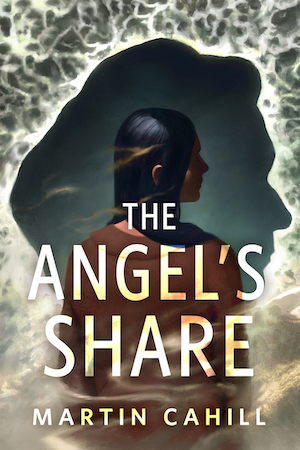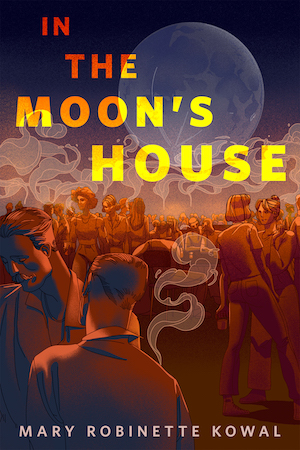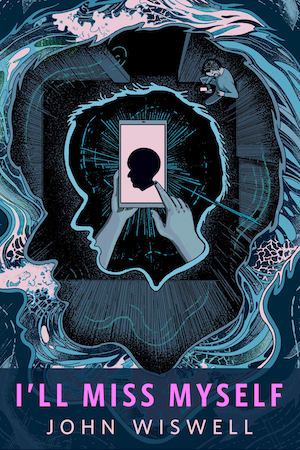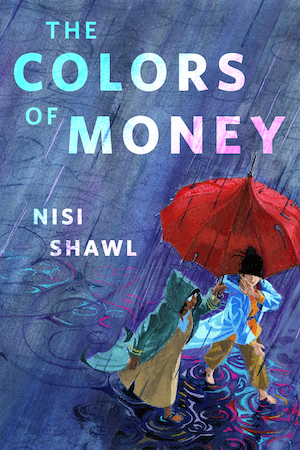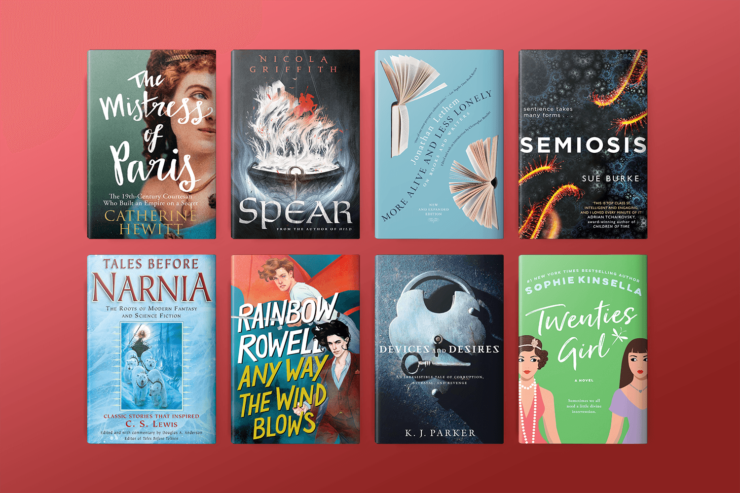July was a great month that began with a restorative trip to Gaspésie with friends and ended with a trip to Chicago, where I still am. It’s so wonderful and amazing to be spending time with friends and having conversations, wow, I have been missing that desperately. I read sixteen books, some of them very long, but a mixed bunch like always, and some of them were really amazing.
Semiosis, Sue Burke (2018)
Terrific novel about generations of colonists on another planet, with fascinating plant alien POV. This book had a stunning, and stunningly offputting, cover, black with a curled metallic-looking tentacle, which made it look like horror. Even with strong encouragement from friends to read it, I kept on giving it the side-eye, and yet this is a book exactly written for me to like. You’d think I’d have learned not to judge a book by its cover, but yet. This is a terrific book, and it should have been a major book everyone was talking about—could others have been put off by the cover too? In fact, it’s a thoughtful fun exploration of the interaction of a specific human future society over time with lots of very alien aliens. Semiosis is perfect for fans of C.J. Cherryh’s Forty Thousand in Gehenna, Le Guin’s anthropological novels, or Octavia Butler. It also has a lot to say about core values of societies and how they change over time, which is deeply political in an often overlooked way, as well as the way society responds to the alien. Terrific book. There’s a sequel and I’ll be reading it soon.
Any Way the Wind Blows, Rainbow Rowell (2021)
Third book in the Carry On series, do not start here, but this is great—I liked it better than the middle book if not as much as Carry On. Bought it the day it came out and read it almost as fast. Tons of fun.
More Alive and Less Lonely: On Books and Writers, Jonathan Lethem (2017)
A book of essays about books, very enjoyable if somewhat slight. It made me like Lethem as a person to see his quirky tastes and enthusiasm, though we have very little overlap in things we like.
Spear, Nicola Griffith (2022)
Novella. Brilliant. I was sent this to blurb, and I was all ready to say no to a “feminist Arthurian novella” before I saw it was Griffith. I was right to trust her, she absolutely knows what she’s doing with this difficult material. This is as good as Hild and even more resonant. She handles the myth and the history both deftly and beautifully. I loved this. It’s a long, long time since I read anything Arthurian I liked as much as this. I’m sorry you have to wait for it to come out, but do read it as soon as you can. Clever and gripping and just all round marvellous.
Olaf’s Saga, Snorri Sturluson, John Sephton (ed) (1225)
Icelandic saga about King Olaf of Norway, his coming to the throne, his wars, his tax policy, his interactions with King Canute, an attack by a troll woman, more tax, how he lost the throne and went to Russia, how he came back from Russia and fought a battle in which he was killed, his subsequent miracles and sanctification. It’s very long and Norse, and I enjoyed it but don’t want to read another saga right away.
Tales Before Narnia: The Roots of Modern Fantasy and Science Fiction, Douglas Anderson (2008)
An anthology of works that influenced C.S. Lewis, or might have, or which he almost probably read. There are some very good bits here, and some less good (“Undine”, no thanks) and it’s an odd mix that doesn’t really fit together to form any kind of coherent sense of anything. I mostly enjoyed it, and skipped the stories I wasn’t enjoying. Not worth going out of your way to get, but worth reading if it falls under your eyes.
Speaking of Slavery: Color, Ethnicity, and Human Bondage in Italy, Stephen A. Epstein (2001)
An interesting, if grim, book about Medieval and Renaissance slavery in Italy, trying to uncover through written records of various kinds the way Italians thought and spoke and wrote about slaves, and doing its best to recover the rare traces of the voices of the slaves themselves. So it’s looking at law codes, records of sales, letters, legal cases, all kinds of documents. It’s very thorough, and very well done.
That Summer in Sicily, Marlena de Blasi (2008)
Another memoir by the author of A Thousand Days in Venice this time about a trip to Sicily and the strange life of a woman she meets there who tells her her life story. I didn’t like it as much as de Blasi’s own memoirs, but it was fascinating in its own right and I’m very glad I read it. Terrific descriptions of food, as always.
A Million Open Doors, John Barnes (1992)
Re-read, bath book. Barnes’ best novel by a long way, I love this book. It’s a universe where all the nearby settleable planets were settled slower than light by different cultures who wanted their own planet, and now they’re all being recontacted slowly by instantaneous transmitter and it’s changing everything. This is the story of a young man from a culture based on Provencal troubadors who goes to a culture based on utilitarianism and how he grows up. It’s just great. Do read it. Do NOT read the sequels, because they don’t go anywhere. This was one of my actual examples for how it’s OK to read the first book in a series and then stop. But gosh I enjoyed reading this again.
The Mistress of Paris: The 19th-Century Courtesan Who Built an Empire on a Secret, Catherine Hewitt (2015)
I somehow wasn’t expecting the empire to be France’s involvement in Vietnam. Interesting book about the life of Valtesse, a woman who rose from nothing to be an immensely rich courtesan. There’s a lot of this book where the evidence is thin, and using fiction Valtesse wrote may give some information but treating it as literal biographical information seems foolhardy. Sometimes we just don’t know things, but this book is of the “must have thought” school of biography. Interesting but not really recommended.
Dynevor Terrace, Charlotte M. Yonge (1857)
Immensely long Victorian novel in which people grow up, have accidents, make fortunes, lose fortunes, learn better, marry, do not marry, have children, and sometimes die. This is not Yonge’s best work, but it is very representative and, as usual for me with Yonge, as soon as I got into it properly I couldn’t put it down. Her huge books are not really like anything else, they have a unique flavour. This one involved a trip to Peru. Reading Yonge makes me happy, and there are still a few I have not yet read.
Twenties Girl, Sophie Kinsella (2008)
Wow! Why didn’t anyone tell me this one has a ghost! Funny clever chick lit book about a young woman with an unsatisfying career and love life who finds satisfying ones while accompanied by the ghost of her dead great aunt. This is really a book about how old people were young people and had lives and loves, and it’s definitely the best Kinsella I’ve read so far. There’s nothing this kind of book needs more than some well-done fantasy to make it more interesting.
Tales of the Jazz Age, F. Scott Fitzgerald (1922)
A collection of Fitzgerald’s short stories, almost all of them excellent. He only wrote in one octave, but he did that particular octave superbly. I don’t want to read him very often, but there’s nobody like him. I also think he was much better at short lengths where he didn’t have to sustain the plot or character sketches, just put them together and move on to the next.
The Duplicate Bride, Ginny Baird (2020)
This was fun, a romance novel in which the twin sister refuses to stand in at the pre-wedding party but is assumed to be her sister anyway and things get out of control. Well written and well thought through and, surprisingly, considering this was a genre romance novel, I found myself concerned that things might not all work out in the end. Excellent ditzy mom, a little too much luxury, but good family dynamics.
Devices and Desires, K.J. Parker (2005)
Yes, this was another great Parker, with a siege, with cunning plans, and with interesting worldbuilding. For one thing, there’s a city that has industrial production and specifications as a civic religion, essentially, and they make all the things. Interesting set of points of view. Full of logistics. Also big spear-hurling catapults. Also, why did Z do the thing that makes all the other things happen? I must know!
Evil For Evil, K.J. Parker (2006)
The second in the trilogy, lots more of all of the above, plus extra scheming, potential gunpowder, ironclad wagons, and vast quantities of desert nomads. Still no revelation of why Z did the thing! I’m reading the third one now.
Jo Walton is a science fiction and fantasy writer. She’s published two collections of Tor.com pieces, three poetry collections, a short story collection and fifteen novels, including the Hugo- and Nebula-winning Among Others. Her novel Lent was published by Tor in May 2019, and her most recent novel, Or What You Will, was released in July 2020. She reads a lot, and blogs about it here irregularly. She comes from Wales but lives in Montreal. She plans to live to be 99 and write a book every year.


